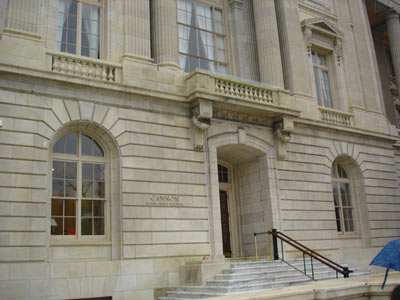So I just came back from the Cannon building, which is where Congresscritters in the House keep their offices. I was with a fellow Boulderite and a staff person from Americans United for Separation of Church and State. It was an interesting experience, though brief.
The building is not far from the Capitol, of course, but it’s a big ol’ marble rectangle, and not terribly pretty.

We wandered down the corridor (it’s easily 100 meters long) to the office of Representative Mark Udall (D- CO) of Colorado’s second district, which includes my home of Boulder and a whole passel of mountains to the west. There were the requisite pictures of the mountains and other Boulder locales on the walls, but also two nice shots of a Shuttle launch, a reminder that Udall is pro-space and pro-science.
We met with Stan Stoss, Senior Legal Counsel for Representative Udall (it’s far more common to meet with staff rather than the Congressfolks themselves). We discussed a proposed bill, H.R. 1431, the Workplace Religious Freedom Act. Sounds nice, right? Who would object to religious freedom? The problem is, as it stands the bill would open the door to employees proselytizing to others at the workplace, refusing to do important work if they hold religious objections (like pharmacists not dispensing certain drugs), and more. Basically, the bill, essentially an update of Article 7 of the Civil Rights Act of 1964, is overly broad. The sponsors (including both Dems and Repubs) have their hearts in the right place, but have made this bill too fuzzy, allowing civil rights – a defensive freedom – to be used aggressively and reduce the rights of others (for example, the right not to be proselytized at).
I personally think the whole bill is misguided, elevating the rights of the religious over the secular. While I do think people have the freedom to believe what they want, it is critical that their rights not be any different than those who are not religious. It smells to me like a wedge issue, a way to sneak in legislation that sounds like it increases rights, but actually reduces them.
The meeting with Mr. Stoss went well, I think. He was attentive, and grilled us a bit on what we thought of the bill, and how we thought it would affect people. The bill has been floating around for some time (a few years, in fact), and may make some progress this year, and he said he was grateful we brought it to his attention.
All in all, it was a nice, quick, and efficient meeting. If there is some topic, some subject that concerns you about government, I would encourage you to seek out your representatives in Congress. But there are some lessons learned: make sure you understand the topic you’re discussing; the staff members of Congress (and the elected officials themselves) can be very sharp, and may put you to the test. Remember, they take their jobs very seriously – as well they should – and know that what they recommend to their boss may affect millions of people. So know your stuff.
Also, be polite and friendly! That goes a long way. Say that you are a constituent, of course. And this sounds corny, but be honest, be earnest, and don’t be afraid to speak your mind.
This government is still by, for, and of the people. That’s us. Exercise your rights! I heard over the weekend that just a few letters to a state legislator swayed their vote on a proposal. It may be a little more difficult to do that on the national level, but it’s still possible. Go ahead: make a difference.